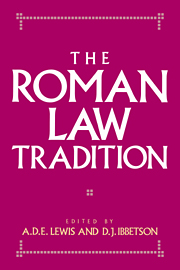Book contents
- Frontmatter
- Contents
- List of contributors
- Foreword: Peter Stein, Regius Professor of Civil Law in the University of Cambridge, 1968–1993
- List of abbreviations
- 1 The Roman law tradition
- 2 Labeo and the fraudulent slave
- 3 Doing and causing to be done
- 4 The danger of definition: contrectatio and appropriation
- 5 Going to the fair – Jacques de Révigny on possession
- 6 Bembo giureconsulto?
- 7 Gentilis and the interpretatio duplex
- 8 Ius gentium in the practice of the Court of Admiralty around 1600
- 9 Stair's title ‘Of Liberty and Servitude’
- 10 The actio communi dividundo in Roman and Scots law
- 11 Sale and transfer of title in Roman and Scots law
- 12 ‘What Marcellus says is against you’: Roman law and Common law
- 13 Audi et alteram partem: a limit to judicial activity
- Index of sources
- Index of names and subjects
2 - Labeo and the fraudulent slave
Published online by Cambridge University Press: 08 October 2009
- Frontmatter
- Contents
- List of contributors
- Foreword: Peter Stein, Regius Professor of Civil Law in the University of Cambridge, 1968–1993
- List of abbreviations
- 1 The Roman law tradition
- 2 Labeo and the fraudulent slave
- 3 Doing and causing to be done
- 4 The danger of definition: contrectatio and appropriation
- 5 Going to the fair – Jacques de Révigny on possession
- 6 Bembo giureconsulto?
- 7 Gentilis and the interpretatio duplex
- 8 Ius gentium in the practice of the Court of Admiralty around 1600
- 9 Stair's title ‘Of Liberty and Servitude’
- 10 The actio communi dividundo in Roman and Scots law
- 11 Sale and transfer of title in Roman and Scots law
- 12 ‘What Marcellus says is against you’: Roman law and Common law
- 13 Audi et alteram partem: a limit to judicial activity
- Index of sources
- Index of names and subjects
Summary
‘Every age should be the mistress of its own law’. Altmeister Maitland learned this lesson from Germany, and Peter Stein, who has illuminated the history of legal developments in many lands and at different periods, has passed that same lesson on to us. The message from Cambridge is surely correct – provided, of course, the new mistress does not too readily believe that in her salad days all her judgments are better than the mature reflections of her predecessors. Yet even a suitably cautious age will find that some things must simply be fashioned afresh. The assessment of damages under the lex Aquilia is an obvious example. Confronted with unacceptable penal elements and retrospective calculations, legal practitioners soon devised their own schemes, while leaving the Roman rules to be the playthings of generations of legal scholars and historians.
Happily the playthings of Romanists do not wear out quickly, and the Roman rules are studied to this day. But when the original doctrine is discarded in this way, the texts can be particularly difficult to interpret. Since we have all been brought up in a system with different assumptions, we tend to look at the texts through spectacles which are coloured by those assumptions. Even the most conscientious legal historian will find it hard to see a problem as the Roman jurists would have seen it. I have chosen to discuss a text on the lex Aquilia whose interpretation illustrates these problems in an acute form.
- Type
- Chapter
- Information
- The Roman Law Tradition , pp. 15 - 31Publisher: Cambridge University PressPrint publication year: 1994

